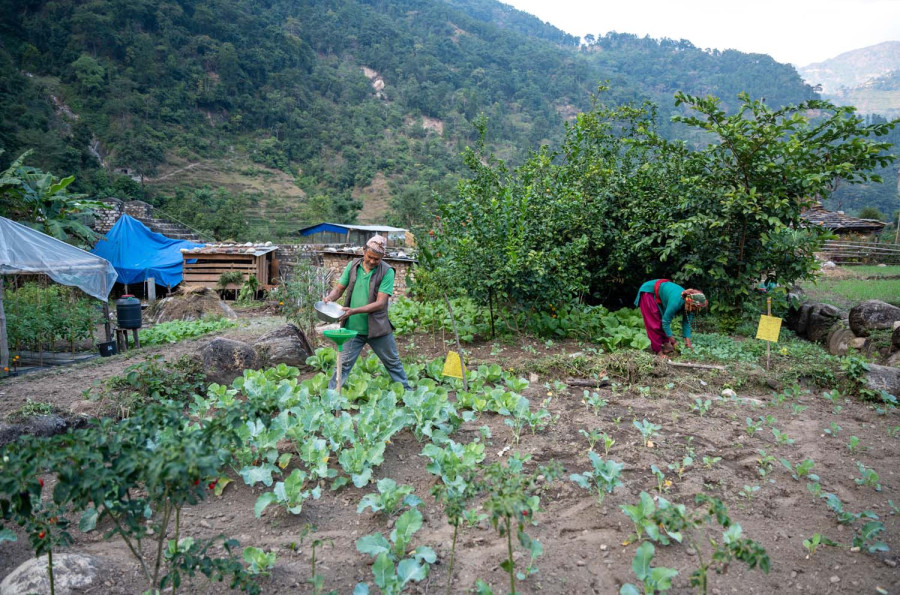Money
Farmers in Rukum West suffer as climate change bites
Droughts, crop failures and rising pest infestations lead farmers in mid-western Nepal to an uncertain future.
Mahesh KC
Gauri Giri, 67, from Gujoldanga of Musikot Municipality, has been baffled by the impact of climate change over the past few years. Lately there has been no timely rainfall nor good crop production as attacks by pests and diseases intensify.
“There has been no rainfall since August last year. Winter crops have dried in the field. I don't know what to eat or how to survive in such harsh climate conditions,” said Giri.
He looks at the sky and the barren fields, with a sense of despair.
Most farmers in the high hills share similar concerns as they witness unpredictable weather patterns.
Tilka Bahadur Shahi, a 71-year-old from Kot of Aathbiskot Municipality, recalled how crops used to grow well, nurtured by regular rainfall.
“But there has been no timely rainfall in the past few years. The fields are no longer green. It’s difficult to save crops without water and fertiliser,” he said.
At this time of the year, the wheat fields should be lush with crops. Instead, Shahi pointed to his dying crops, lamenting that all his hard work had gone to waste. “I don't know what to do,” he added.
The growing impact of climate change has led to sharp fluctuations in weather patterns.
A recent example is insufficient snowfall and winter rainfall, which seriously threaten food security.
This winter's lack of rainfall in the hilly region has directly affected crops, increasing farmers' worries.
According to data from the District Agriculture Development Office, Rukum West has 35,460 hectares of fertile land out of the total 121,200. Farming is done on 16,841 hectares, but only 4,882 hectares have access to irrigation. The rest of the land relies solely on precipitation.
Bharat Bahadur Basnet, deputy chief of the Agriculture Development Office, highlighted the potential to expand irrigation services in Rukum West. “However, this requires a large-scale plan and significant investment. We are working within our budget, but it is not enough,” he said.
Despite the district having numerous rivers and water resources, poor implementation has hindered efforts to make water available for farming. “The land has remained dry for so long that soil fertility is declining,” Basnet added.
The production of both seasonal and unseasonal vegetables, along with winter crops, has decreased.
Krishna Bahadur Khadka, a farmer from Musikot, shared his struggle. “Crops on sloped land won't grow without water. Even irrigated fields show a decline in vegetable production year after year,” he said. “It’s not just the water scarcity—various pests have also damaged our crops.”
Basnet emphasised the toll climate change has taken on farmers’ mental health.
“The direct impact of climate change on agriculture leads to poor production, affecting farmers' psychology. Climate change brings one problem after another,” he said.
An expanding drought has also led to the drying up of water sources. Collecting rainwater during the monsoon could help recharge groundwater and improve soil moisture, but there has been little effort in this regard.
Marginalised communities are hit the hardest by a changing climate. However, support to mitigate these impacts has not reached them yet.
Mahendra KC, the mayor of Musikot Municipality, said while all municipalities have the 'LAPA' (Local Adaptation Plan of Action) to address climate change, implementation remains a challenge without funds.
“We are making plans through relevant divisions, but we cannot fully implement them without sufficient budget,” he said.
Birkha Bahadur Bista, chairman of Sanibheri Rural Municipality, stressed the need for coordinated efforts.
“The province and the federal government must work together on special plans. We prepared plans two years ago, but planning alone is not enough,” said Bista.
Despite following the LAPA, many projects require funding more than what local governments can provide. As a result, the general public and marginalised communities remain at risk.
Increased carbon emissions have further disrupted natural weather patterns. Basnet suggested a return to traditional farming practices to minimise climate change's impact.
“We should grow traditional crops like millet, buckwheat, barley, and foxtail millet. These crops require less water and fertiliser and can thrive in dry conditions,” he said.
Basnet urged farmers not to depend solely on the weather or the government. “Instead of leaving fields barren due to drought, we should cultivate crops that can withstand these conditions,” he said.




 14.12°C Kathmandu
14.12°C Kathmandu













